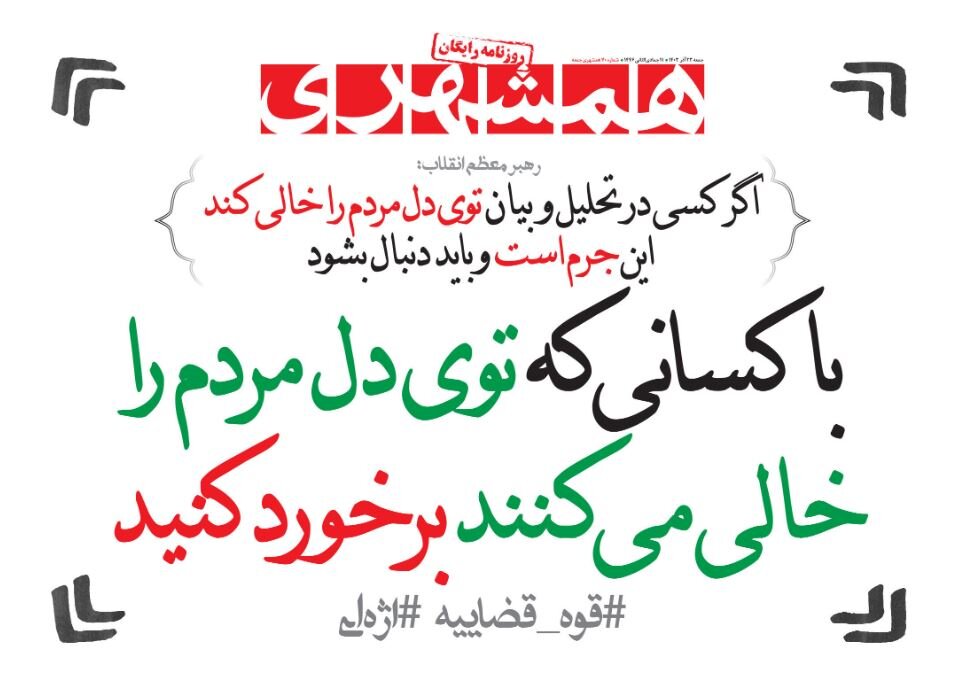TEHRAN PAPERS

TEHRAN - In a note, Hamshahri dealt with the increase of Iran's infiltration into Israel's security structures.
It wrote: These days, concern about Iran's increasing infiltration into various structures of the Zionist regime has become one of the most important political-security concerns of Tel Aviv in facing the Islamic Republic. It seems that after the implementation of the "True Promise II" operation, the Zionist authorities were more worried about Iran's security infiltration into the occupied territories. Although the Zionists tried to hide the strikes by launching a propaganda campaign after Operation "True Promise I", during "True Promise II", the high volume of hits could not be hidden. More than anything else, the accurate hitting of the missile depots indicated Iran's precise information about the military-security goals of the Zionist regime. An issue that seems to have faced the security authorities of this regime with an important challenge called “Iran's security penetration.”
Ettelaat: Plots will intensify against Iran
In an article, Ettelaat addressed the developments in the Middle East, especially in Syria, and the performance of Iran after these events. The paper said: The Middle East has become the center of strange political and social developments. In such a situation, we need to know what direction the future conditions in the region will take and what the Islamic Republic of Iran can do. It seems that threats and sabotage attacks against the Islamic Republic of Iran will intensify based on the expansionist and aggressive strategies of the Israeli regime. In such a situation, the Islamic Republic of Iran and the Resistance Front should put themselves in a position of renewal and strength. The Islamic Republic of Iran is the leader of the resistance groups and more than others it is most exposed to threats and conspiracies. Therefore, it must take serious measures to strengthen its internal power because inciting and equipping forces opposed to the Islamic Republic, launching media wars and cyberattacks, creating public discontent among the people, etc. are on the list of programs of this regime against Iran.
Etemad: Regional states concerned over Turkish influence in Syria
In an analysis, Etemad discussed the role of Syria in the overthrow of Bashar al-Assad. It wrote: The developments in the Middle East and the confrontation between Tel Aviv and Hezbollah changed the balance of power between Iran and Israel, and now the fall of Bashar al-Assad can affect the position of Iran and the resistance front. However, the wider consequence of recent developments is a change in the balance of power between Turkey and other regional and extra-regional actors. What is clear is that Turkey's achievements in Syria have been highlighted and Ankara's influence in Lebanon and Iraq may increase. Turkey's achievements may affect Tehran's interactions and have consequences for other regional actors. From Iran's point of view, the fall of Assad may provide the basis for changing Tehran’s strategy. But as observers say, Turkey's achievements in Syria can be worrying signs for the whole region. Iran sees Turkey as a regional competitor. A rival who secretly challenges Tehran's influence in the Middle East and the Caucasus. A geography where the two players have been competing for a long time.
Arman-e-Emrooz: Conditions of Iran after Assad
In an explanation, Arman-e-Emrooz analyzed Iran's future policy after Assad and wrote: Considering the anti-Israeli nature of the Islamist movement in Syria and the closeness of some of them to Hamas, perhaps this channel will provide an opportunity for Tehran to play a role in this regard in the future. The continuation of Israel's attacks on Syria and serious hatred toward the occupation and apartheid regime can increase the chance of creating this opportunity for Iran. Considering the escalation of tension in the future, Tehran may be led to redefine its regional priorities and strengthen relations with Syria’s actors to pass this stage. It is also possible that the Iranian government will focus more on strengthening its internal front and solving its problems and negotiations to lift sanctions. Of course, before the formation of such negotiations, it is not unlikely that Israel will take action against Iran's nuclear program with a green light from the United States. Apart from these goals, another goal may be to remove Iran's nuclear leverage in order to get concessions in the negotiations.

No comments:
Post a Comment